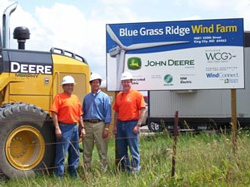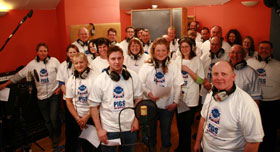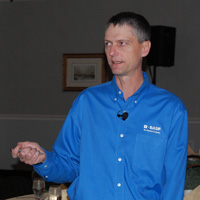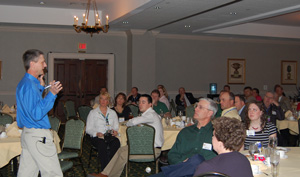 Current AAEA President John Walter, Successful Farming, wrote about 10 opinions he’s got about the organization in the latest issue of their newsletter, The Byline. You’ve got to be a member to get it. I just had to make a comment about his opinion #5 though.
Current AAEA President John Walter, Successful Farming, wrote about 10 opinions he’s got about the organization in the latest issue of their newsletter, The Byline. You’ve got to be a member to get it. I just had to make a comment about his opinion #5 though.
5. We should have an AAEA blog. Maybe we could pass it around. Who wants to go first?
Yes! That’s a good one John. I think you’re really getting it and I’m glad to hear it from the leadership. An AAEA blog would be awesome (as long as there’s someone to post onto it!). I’m only overseeing about 21 of them at the moment in varying levels of involvement but I volunteer to assist somehow. Anyone else want to step up? Let John know.
Are Ag Journalists in Danger?
 The latest issue of the IFAJ newsletter contains an interesting survey. It’s really just one question, “What dangers do you face in your work as an agricultural journalist or editor?” The choices are:
The latest issue of the IFAJ newsletter contains an interesting survey. It’s really just one question, “What dangers do you face in your work as an agricultural journalist or editor?” The choices are:
You may choose more than one answer.
Failing to try new ideas
Budget cuts
Media convergence
Losing journalistic integrity
Freedom of expression
Emergence of new media – blogs, internet news sites etc
No time to look ahead
Physical dangers
Other dangers – please explain
I was kind of taken back at first at the concept of “danger” to agricultural journalism jobs. I took this to mean that someone is afraid. Perhaps afraid that they’ll have a job? I’ve always lived with the idea that there is no such thing as job security, that the only way I can secure an income for myself and my family is to work hard and do the best job I can. Maybe I’m missing something here. I believe we’re in a period of unbelievable opportunity in ag journalism. I don’t care if you’re a freelancer or work for a major corporation. If your job is in jeopardy then be looking for something else because there’s a lot of opportunities out there.
I realize that there may be situations within the IFAJ membership in other countries that I’m not aware of that is prompting this kind of survey. There are still countries where there is no such thing as “freedom of the press” for example. There are countries where physical danger exists just to survive. I can’t even imagine what working in those situations are like. At least here in America I do believe we’ve got it good and the only danger I see is the first choice listed above, “Failing to try new ideas.”
What are your thoughts on this? Feel free to comment.
Farm Foundation Forum Podcast
 The term podcast has different meanings to different people. Me, I think it has to involve RSS so it can be subscribed to. To some it’s just a web link to an audio file. That’s the way the folks at Farm Foundation Forum view it with the posting of their “podcast” from today’s discussion. The audio quality is quite good and you can find it with this link.
The term podcast has different meanings to different people. Me, I think it has to involve RSS so it can be subscribed to. To some it’s just a web link to an audio file. That’s the way the folks at Farm Foundation Forum view it with the posting of their “podcast” from today’s discussion. The audio quality is quite good and you can find it with this link.
The Forum topic: Factors and Impacts of U.S. Food Price Increases
Charlie Stenholm was the moderator.
Presenters were:
Ephriam Leibtag, USDA Economic Research Service
Sophie Milam, Bread for the World
Scott Faber, GMA/FPA
Jon Doggett, National Corn Growers Association
The next Farm Foundation Forum is scheduled for April 8.
Meet The New EPIC Executive Director
 The Ethanol Promotion and Information Council (EPIC) has a new executive director. She’s Toni Nuernberg, who comes to EPIC from ACA International in Minneapolis where she worked for 29 years, the last 12 as chief operating officer of ACA International Holding Company Inc. and its for-profit subsidiaries.
The Ethanol Promotion and Information Council (EPIC) has a new executive director. She’s Toni Nuernberg, who comes to EPIC from ACA International in Minneapolis where she worked for 29 years, the last 12 as chief operating officer of ACA International Holding Company Inc. and its for-profit subsidiaries.
Nuernberg says when she decided to make a career move she was looking for an exciting new industry with lots of potential. “Clearly the ethanol industry is that and so much more,” she says. “The thing that struck me about it was that every person that I talked with about this position from the CEOs of the member organizations to the staff was their passion and the excitement that they feel about this industry.”
You can find out about her background, her goals and ideas for moving EPIC and the ethanol industry to a new level in their latest Fill Up Feel Good podcast, a program ZimmComm produces.
You can listen to it here: epic-podcast-2-4-08.mp3
Farming Wind Energy
Noting runs like a Deere, except maybe the wind. And now John Deere is farming that wind.
 John Deere Wind Energy is into lots of domestic energy projects these days and that includes investing in and providing value-added services to utility-scale wind projects that involve multiple wind turbines with a nameplate capacity of 1.25 megawatts or greater.
John Deere Wind Energy is into lots of domestic energy projects these days and that includes investing in and providing value-added services to utility-scale wind projects that involve multiple wind turbines with a nameplate capacity of 1.25 megawatts or greater.
For example, Corn Plus Cooperative, a farmer-owned ethanol plant in Winnebago, Minn., entered into an agreement with John Deere last year to harness wind energy to help power their plant.
Two years ago, John Deere Wind Energy partnered with Missouri based developer Wind Capital Group and the Missouri Rural Electric Cooperatives to construct a 50-megawatt wind energy project in King City, a little farming community about 30 miles northeast of St. Joseph. The project was named “Blue Grass Ridge” in tribute to the farming community’s historic role in bluegrass seed harvesting.
Here’s a YouTube video that provides a look at that completed project:
Blue Grass Ridge led to a second 50-megawatt Missouri wind farm – the Cow Branch Wind Energy Project located between Rock Port and Tarkio in Atchison County, Mo.
Be The Sloppiest Joe
 Do you know Joe? As in Sloppy Joe? This is “The Joe You Know.” Well Cargill Meat Solutions is looking for the sloppiest kid in America at BeSloppy.com. One very messy kid under the age of 10 will win a college fund and top honors as the “Sloppiest Joe.”
Do you know Joe? As in Sloppy Joe? This is “The Joe You Know.” Well Cargill Meat Solutions is looking for the sloppiest kid in America at BeSloppy.com. One very messy kid under the age of 10 will win a college fund and top honors as the “Sloppiest Joe.”
From March 3-30, parents can visit BeSloppy.com and submit a photo of their child eating a sloppy joe. Nominations will be posted online, and beginning April 12, site visitors will have two weeks to vote for their favorite photo.
The child whose photo receives the most votes will be named “Sloppiest Joe” (http://besloppy.com/contest.html) and awarded a $1,000 U.S. savings bond for their college education. Two runners-up will receive a year’s supply of fresh ground beef for the family.
BeSloppy.com was created to help families put a new twist on an old favorite recipe, the sloppy joe. The site contains 16 not-so-average sloppy joe recipes, including Maui-Wowie Joe, Sloppy Cho and Sloppy Joeganoff.
“We know it’s difficult for parents to plan different meals that their kids will enjoy. I’ve found it’s much easier to take familiar meals and change them up for kids with their favorite flavors,” said Chef Pete Geoghegan, corporate chef for Cargill, the company managing the contest. “That’s why we’ve updated the classic meal to include ingredients like fruit, vegetables and even jelly. And the bonus for parents is more interesting recipes that are still tasty and quick to prepare.”
Pigs Are Worth It
 In England they think Pigs Are Worth It. Would you agree? I think this is absolutely hilarious and serious. Apparently British pig farmers are losing their you know whats and they’re asking consumers to help out.
In England they think Pigs Are Worth It. Would you agree? I think this is absolutely hilarious and serious. Apparently British pig farmers are losing their you know whats and they’re asking consumers to help out.
Due to price pressure from supermarkets, farmers are now being paid around £1.10 per kg for a pig that now costs them £1.44 per kg to produce.
For every pig a farmer rears and sells, he is likely to lose over £20. This can’t go on. Today, we’re launching our campaign to press the supermarkets to ensure that pig farmers are paid a fair and sustainable price. Continual pressure on the price of pork, bacon and ham will squeeze the life out of pig farming.
We need the supermarkets to pay an extra 34p per kg to help preserve British pig farming. If this price rise were passed on to shoppers, it would only mean between 7p and 17p on the pack price of typical pork products. We think it is a small price worth paying and we’re asking British consumers to back us.
To help you understand what’s going on they’ve recorded “Stand By Your Ham.” Listen to it or watch the video and sing along with the lyrics. Here’s an excerpt:
Right now it’s hard to make a living
Rearing all your pigs for pork and Ham
Supermarkets make all the money
We don’t make any money
And that’s quite hard to understand
But if they gave us a little more money
Gave us farmers, a fairer share.
Coz we take good care of our pigs
We’re so proud of them
To us they’re more than pork and ham
New Holland Helping the Media Get the Message Out
 I know we’ve heard a lot from Gene Hemphill here on AgWired the past few days but well we should. Here’s my interview with him from the trade show floor at Commodity Classic. In it we talk about his support of the ag media including sponsoring the media room. Gene says they’ve been doing it since Commodity Classic started and before that individually at the organizational meetings of the groups involved with Classic.
I know we’ve heard a lot from Gene Hemphill here on AgWired the past few days but well we should. Here’s my interview with him from the trade show floor at Commodity Classic. In it we talk about his support of the ag media including sponsoring the media room. Gene says they’ve been doing it since Commodity Classic started and before that individually at the organizational meetings of the groups involved with Classic.
Gene says they don’t just sponsor media rooms at events like this just to get a microphone or reporter in front of their representatives. He says that many of their staff are farmers or come from farms and so they feel a need to do what they can to help get information out from meetings like Commodity Classic. He says that the company’s sponsorships help them keep in touch with the media and through them to help keep their customers up to date with what’s happening in the industry.
At some of these events he says they even provide staff like himself to help manage the media rooms. We’ve all seen Gene making coffee and bringing in the donuts at Farm Progress Show for example.
Listen to my interview with Gene here: cc-08-hemphill.mp3
AgWired coverage of the 2008 Commodity Classic
is sponsored by:  and
and 
The Gene Hemphill Media Reception
 There aren’t too many people in agricultural marketing who don’t know Gene Hemphill, Industry Affairs, New Holland. You probably know that we honored him at the media reception at Commodity Classic. This week’s program expands on that theme. Gene is a friend as well as a client and beloved by all of us in the media who have worked with him for so long. For all the attention he’s getting for “partially retiring” I can’t wait to see what happens when he really retires!
There aren’t too many people in agricultural marketing who don’t know Gene Hemphill, Industry Affairs, New Holland. You probably know that we honored him at the media reception at Commodity Classic. This week’s program expands on that theme. Gene is a friend as well as a client and beloved by all of us in the media who have worked with him for so long. For all the attention he’s getting for “partially retiring” I can’t wait to see what happens when he really retires!
I promise you this isn’t too long (since I cut him off) but you can not only listen to Gene’s comments at the media reception but you can also watch them in this video. The lighting was kind of funky and at one point we went to full dark but it works. You’ll see Emcee Mike Adams, AgriTalk, introduce Gene first.
Before hearing Gene’s comments in this week’s program you can hear Pam Fretwell’s (WTAD) story about how she met Gene. It’s a good example of the stories we heard at the reception. I did record the full presentation which I’m sending to Gene on a disk so he can show it to his wife and kids.
You can download and listen to the ZimmCast here:  ZimmCast 161 (17 min MP3)
ZimmCast 161 (17 min MP3)
Or listen to this week’s ZimmCast right now:zimmcast161-3-3-08.mp3
The ZimmCast is the official weekly podcast of AgWired which you can subscribe to using the link in our sidebar. You can also subscribe in iTunes
AgWired coverage of the 2008 Commodity Classic
is sponsored by:  and
and 
Kip’s Tips
 Kip Cullers of Missouri is not only a great corn and soybean grower, he has become one heck of an entertaining speaker. He’s really fun to be around, but he is totally serious about helping other growers meet their optimum potential for yields.
Kip Cullers of Missouri is not only a great corn and soybean grower, he has become one heck of an entertaining speaker. He’s really fun to be around, but he is totally serious about helping other growers meet their optimum potential for yields.
Kip revealed some of his record-breaking yield tips at the American Soybean Association-BASF breakfast at the 2008 Commodity Classic last week. The breakfast was attended by growers enrolled in the 2008 Secure Optimal Yield (SOY) program, a joint program of the ASA and BASF that is designed to help soybean growers maximize yields and net profits.
 Kip says with prices where they are today, growers should make every effort to maximize soybean yields. “Soybeans now are $15, so – my gosh – you can spend a little and make a bunch. It’s simple economics.”
Kip says with prices where they are today, growers should make every effort to maximize soybean yields. “Soybeans now are $15, so – my gosh – you can spend a little and make a bunch. It’s simple economics.”
His philosophy, whether it’s corn or soybeans, is simple – it’s all about plant health. “Plant the best genetics for your area, protect with fungicide and insecticide program, and don’t let your weeds get out of control,” he says.
Kip yielded an average of 73 bushels per acre of soybeans last year – almost twice the Missouri state average – by following the secrets to success he outlined in his breakfast presentation.
He encourages growers to sign up for the 2008 SOY program. The registration deadline for the program has been extended to March 14.
Listen to my interview with Kip here:
kip.mp3
AgWired coverage of the 2008 Commodity Classic
is sponsored by:  and
and 

